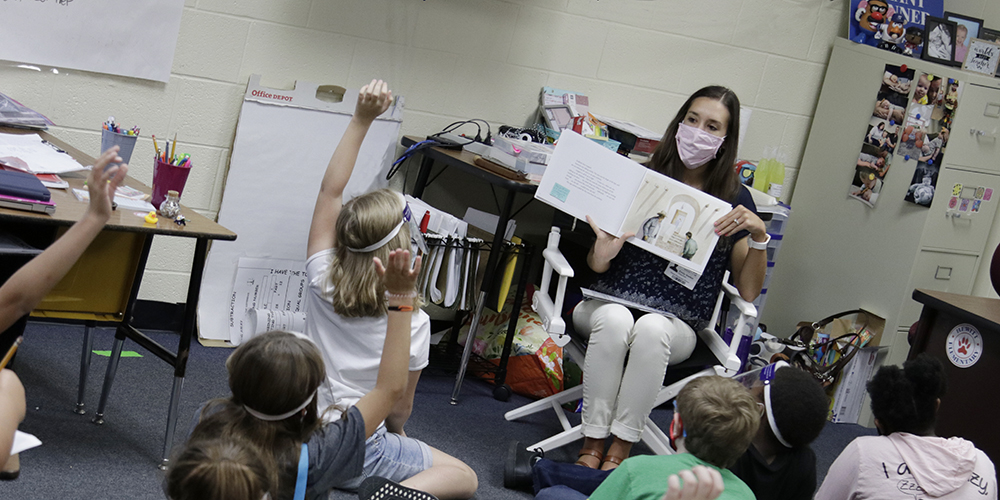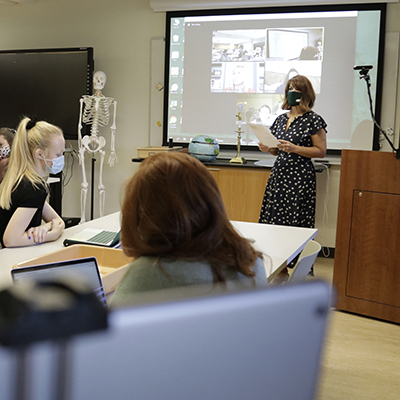Teacher Education in Challenging Times
In the time of COVID, all students — from kindergarten to the graduate level — are experiencing school in new and different ways. For teachers, the challenges are extraordinary. For the future teachers in the School of Education, the everyday need to pivot and be flexible could yield dividends in the long term.
“I think it has been good for our students to see professors and teachers reworking and revising lessons, because that is what they can do for their own students,” said Dr. Suzanne Nesmith, Associate Professor of Science Education and Associate Dean of Undergraduate Education for the SOE.
“It’s taken some rethinking to create the best learning experiences, but everyone is flexible and creative,” she said. “I don’t think I’ve worked this hard since I first started teaching, and that’s the case for everyone.”
Nesmith teaches science methods to Elementary Education majors in a hybrid format — in-person classes in the SOE’s dedicated science lab one day a week and online the other day. She revised her usual hands-on, interactive activities to allow distancing, with everyone wearing face masks. Students do not share supplies, and Nesmith gave each of them a little bag with their own scissors, glue sticks, etc., to start the semester.
The SOE has outfitted many classrooms, including the science lab, in Marrs McLean Science Building with iPads and added microphones, so that students who are in quarantine due to COVID exposure or diagnosis can attend class remotely in real time.
Fortunately, the SOE had iPads on hand in the Learning Resources Center, the School’s dedicated library. Technology Facilities and Resources Manager Tanner Osborn mounted the iPads on tripods, added additional cameras and microphones to rooms as needed, and tested every room for quality.
“We have good audio and video quality,” Nesmith said. “Online students can see the whole room, and we bring them into the discussion. For small-group discussions, we put the iPad into a group.” When Nesmith took the whole class outside one day, they took along the iPad — and the remote students connected to it.
But for education students, academic work extends beyond the Baylor campus into the community, which presents new challenges. Dr. Barbara Purdum-Cassidy, coordinator of the elementary program, said Baylor students and their mentor teachers are “pivoting on a dime” in elementary classrooms. Planning for fall field experiences began early with partner schools, adhering to requirements from the TEA (Texas Education Agency), which sets standards for teacher certification. Student teachers fulfill their clinical teaching in whatever format their mentor teachers do — whether face-to face on a school campus, remotely from the school, or online from separate locations.
Baylor students who are teaching remotely are really learning what engagement looks like online, Cassidy said. “They are figuring out how to co-teach with their mentor, how to coach writing in a small group, how to provide feedback, what the attention span is,” she said. For observations of virtual student teachers, Cassidy and other Baylor faculty are either joining online live or viewing lessons later, depending on the age of the students.
“I absolutely love my work with students this year, even though it’s challenging,” Cassidy said. “It is stretching me, but stretching is good.”
SOE Interns (senior student teachers) teach in a K12 classroom for two semesters full-time Monday through Thursday. Friday seminars with Baylor faculty are online this semester. The two-semester Baylor clinical experience is beyond TEA requirements, which proved beneficial in the spring. When schools closed their campuses in the spring, Baylor seniors had already fulfilled their state requirements.
Baylor juniors — Teaching Associates — typically spend one or two semesters leading small groups four mornings a week in local schools. When COVID hit, that experience too was cut short, and along with many students, Emily Jane Voelkel was disappointed.
Now a senior, Voelkel said, “I was really worried about not getting to teach in person as an Intern, so I feel grateful for that opportunity, although we also do some remote work.” Voelkel loves teaching fourth grade at Hewitt Elementary.
“It’s really beneficial to see how teachers are adjusting and working through challenges,” she said. “They explain, ‘Normally we would do this, but this is how we are adjusting.’”
Voelkel has experienced challenges she never imagined — teaching through plexiglass dividers, keeping students separated, figuring out who’s talking when everyone has on a face mask. Students sit next to the same classmates all the time for ease of contact tracing, she said, “and they sometimes get a little annoyed with their neighbors.” But moving students around is not longer a classroom management option.
Preparing creative lessons is more time consuming too, she said. For her experiment about mixtures and solutions — featuring lemonade powder, marshmallows, and goldfish — she had to pre-bag everything individually.
But she has high praise for the students’ efforts. “They have adjusted to a new way of life so quickly,” she said. If a school goes remote for a limited time, Baylor Interns shift formats along with their mentor teachers, and that happened to several at the secondary level when high schools in Waco ISD went online for a week in October.
“Flexibility has always been the name of the game in teaching,” said Dr. Neil Shanks, Assistant Clinical Professor of Middle and Secondary Education and a social studies educator. “I can’t say enough about how hard our Baylor students have worked, how challenging it has been, and how positive their attitudes have been,” he said.
Shanks supervises Baylor Interns on the campuses that were temporarily remote and said the students have proved their worth to their school communities. “All teachers are in such difficult circumstances and being asked to do so much,” he said. “The Interns are proving to be very valuable to schools.”
The experience will serve them well too, he said. “If they can handle this, along with their coursework and Intern seminar work, any teaching job they have in the future will be a breeze.”
By Meg Cullar

